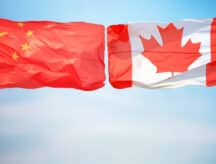Canada ranked safest country on earth for LGBTQ+ travellers, third year in a row
Journalists Lyric and Asher Fergusson run a travel site dedicated to safety. At the beginning of March, they published a report called “The 203 Worst (& Safest) Countries for LGBTQ+ Travel in 2023.”
Discover if You Are Eligible for Canadian Immigration
The journalist took a deep look into LGBTQ+ rights in each country. After over 400 hours of research, they reviewed every country’s individual laws and gathered data from a variety of international sources to create an “LGBTQ+ Travel Safety Index” that will help travellers find the safest countries in the world.
The list of safest countries is based on 10 factors related to LGBTQ+ safety, including protections against discrimination, criminalization of violence and illegality of same sex relationships.
Canada ranked at the top of the 2023 list as the most LGBTQ+ country in the world for the third year in the row. “Canada has a great legislative track record for LGBTQ+ rights. They were one of the first countries to legalize same-sex marriage, they have constitutional anti-discrimination protections and the majority of Canadians report that is a safe place to live for gay and lesbian people,” said Fergusson.
LGBTQ+ communities in Canada
Cities like Toronto, Vancouver and Montreal have some of the largest LGBTQ+ communities and are ranked the friendliest cities in Canada.
Toronto has Canada’s largest gay community, and the Church and Wellesley Village is part of Toronto’s most vibrant and populated LGBTQ+ neighborhoods. Toronto Pride is known for its celebrations and festivities celebrating unity and acceptance of the LGBTQ+ community.
Montreal is another city with a large gay community. The city has Montreal Pride, the “Gay Village” and many same-sex bars and clubs. Since 1988, Montreal has hosted the LGBTQ+ film festival which educates and raises awareness about the community.
Vancouver’s LGBTQ+ community is located around Davie Street and Commercial Drive in Grandview, which is home to Qmunity, a center which provides youth and senior programs, Trans ID clinic, employment support and counselling programs to the LGBTQ+ community.
Canada’s top ranking
The factors that contributed to Canada’s top ranking include LGBTQ+ protections in the workplace, joint and second parent adoption recognition and transgender legal identity laws.
The top-ranking highlights Canada’s commitment to creating an inclusive society for all individuals, regardless of sexual orientation or gender identity. This is especially important to newcomers to Canada who may come from countries where LGBTQ+ rights are not protected and who may be seeking a safe and welcoming environment.
Canada has various immigration policies recognizing the rights of LGBTQ+ individuals. Same-sex marriages and relationships are eligible for family class sponsorship and economic class immigrants can be accompanied by their same-sex partner. In addition, same-sex spouses or partners of Canadians or permanent residents can be eligible for an open work permit while their permanent residence application is being processed.
Canada has a history of providing protection to and helping resettle the world’s most vulnerable groups, including those in the LBGTQ+ community. Immigration, Refugees and Citizenship Canada (IRCC) encourages the sponsorship of refugees who face violence and persecution due to their sexual orientation, gender identity, gender expression or HIV status.
One of the ways IRCC supports the LGBTQ+ community is by providing funding support to the Rainbow Refugee Society, which works with sponsorship agreement holders to sponsor LGBTQ+ refugees to come to Canada.
In addition, IRCC provides resources and access links to national organizations that work to promote and protect sexual orientation rights. For example, the charity Eagle Canada has contributed to advancing gay and lesbian equality by pressing for the addition of sexual orientation as a prohibited ground for discrimination under the Canadian Human Rights Act and intervening in the Supreme Court of Canada for the recognition of same-sex relationships.
Canada’s top ranking demonstrates the country’s commitment to LGBTQ+ rights and inclusion, and the country’s continued efforts towards creating a more inclusive society for all individuals.
- Do you need Canadian immigration assistance? Contact the Contact Cohen Immigration Law firm by completing our form
- Send us your feedback or your non-legal assistance questions by emailing us at media@canadavisa.com







